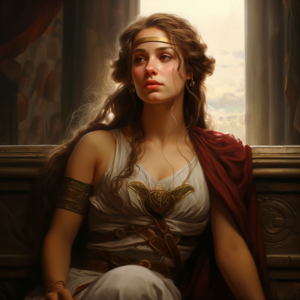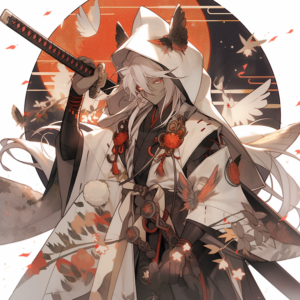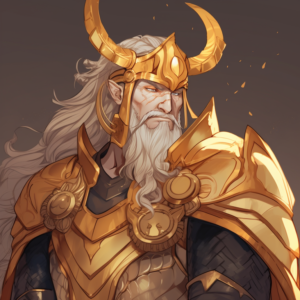Heimdall (or Heimdallr in Old Norse) is the Watchman of the Norse Gods. He guards the entryway of Asgard, the realm of the gods and stands firm at the edge of the Bifrost, the rainbow bridge that connects Asgard to Midgard (the realm of humans). Heimdall’s home near the Bifrost is called Himinbjorg (“sky cliffs”), where he keeps a vigil on the Bifrost and drinks heavenly mead.
Family
Heimdall is said to be a son of Odin, born from 9 mothers who were all sisters; the theory is that he is the son of the 9 daughters of the sea god, Aegir.
In Norse mythology, Heimdall is also known as the Father of Humankind because he helped establish the hierarchical structure of Norse society. In the Norse poem Rigsthula, Heimdall slept with three different human couples from different social classes for three nights. In the poem, these couples are named “Great-Grandparents,” “Grandparents,” and “Parents.” The social classes were serfs, peasants, and nobles.
The first born was an ugly, but strong boy named Thrall—ancestor of all serfs. Then came Karl, the ancestor of all peasants and skilled farm worker. Finally, Jarl, the ancestor of all warriors and nobles, was born with great intellect and the skills of hunting and combat. The names of the three sons became the words that denoted the three social classes in the Norse language.
Symbols
The most common symbol affiliated with Heimdall is the Gjallarhorn, or Resounding Horn. Heimdall would blow the horn to warn Asgard of impending attacks.
In the book Gylfaginning of Prose Edda, Heimdall is said to possess a horse named Gulltoppr, which means “golden mane” or “golden top”.
Powers & Duties
He is known to have great powers of the senses. Heimdall can hear grass grow and even the wool grow on sheep. He can also see more than 100 leagues and needs less sleep than a bird. These powers make him the perfect watchman for Asgard.
Heimdall’s most important duty, besides being Watchman of the Bifrost, is warning. He owns the Gjallarhon, the Resounding Horn, and will blow it when the giants attack; the giants are the enemies of the gods of Asgard. Legend has it that Ragnarok will begin when they attack Asgard and Heimdall blows his horn. Loki will lead the giants to Asgard, while Heimdall will try to stop Loki and they will end up slaying each other.
Many believed that Heimdall sometimes liked to escape his duties of watchman and would go on adventures using the name Rig, which meant king. A very famous story of one of these adventures is how he found and returned Freya’s treasure, the Brisingamen (an amber necklace) after doing battle with Loki who was in the shape of a seal. Loki had stolen the Brisingamen and hid himself amongst seals to avoid detection. But Heimdall, who had been sitting quietly disguised as a seal for hours, watched. He then immediately got down from his rock and punched Loki in the face and retrieved the necklace for Freya.
Facts about Heimdall
- Heimdall’s name is pronounced “HAME-doll”
- He is known as the shining god—the whitest of all the gods. He has golden armor and golden teeth
- The horn, Gjallarhon, is thought to be hidden under the world tree Yggdrasil
- Heimdall owns a golden horse named Gulltoppr;
- Not only does Heimdall have super senses, but he also has foreknowledge
- In Old Norse, Heimdallr means “the one who illuminates the world”
- Not much is known about Heimdall, as there aren’t a lot of surviving poems or artifacts that mention him;
- Some other names of Heimdall are Hallinskidi, which means “ram,” and Gullintanni, which means “golden-teeth”
- He is sometimes associated with sheep and rams. Some believe this to be due to his “golden teeth” because older rams’ teeth have a yellow sheen;
- Heimdall’s sword is called “Head”
- Sometimes, Heimdall is equated with the Vedic deity Dyaus
- He is also sometimes equated with the Christian archangel Michael because he is the link between the realms of the humans and gods and his horn will signal the end of the world
- The three main sources of knowledge about Heimdall are the medieval epic poems, Poetica Edda, Prose Edda, and Heimskringia. There is also an earlier poem called the Heimdalargaldr, in which only two lines survive.






